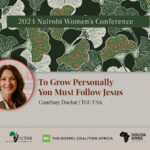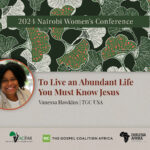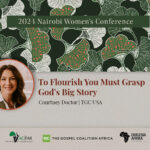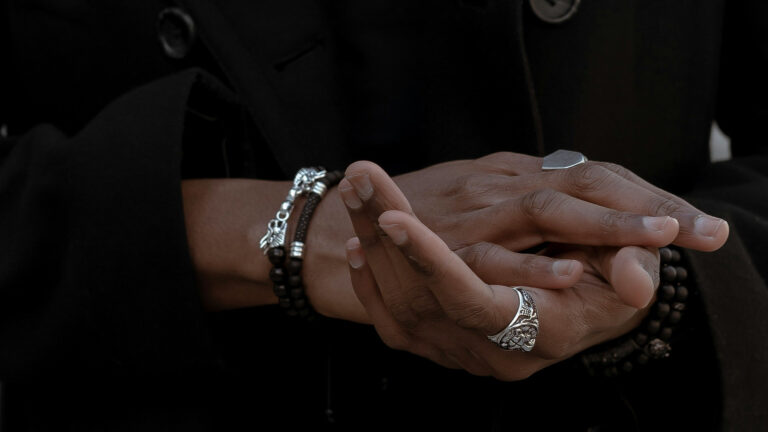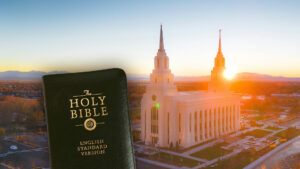Christmas. Is it a pagan tradition that was adopted by early Church Christians? Or is it just an end of the year, winter, European festival that has nothing to do with the end of the year sunny, summer Africa? Or is there more to it? My name is Blaque Nubon, and this is The Gospel Coalition Africa.
Why Do African Christians Celebrate Christmas?
So, if you are a Christian and you’re watching this, trust me, I know you’ve been asked a million times in the many Christmases that you’ve enjoyed, possibly one of these two questions – if not both.
One. Why are you celebrating Christmas if its origins are steeped in pagan traditions that were adopted by the early Church Christians? Or secondly, why are you celebrating Christmas if we’re not sure about the exact date of Jesus’s birth?
Two Truths, One Error
Now in those two questions there are two true statements and one false statement. And here’s what they are.
The true statements. One. It is true that we are not sure about the exact date on which Jesus was born. Because the Bible does not stipulate that date. But that does not deter us from the real reason why we celebrate Christmas – and we’ll speak about that as the video goes on. Secondly, it is true that the lights, the trees and the hanging ornaments from the trees can be traced all the way back to winter festivals in Europe way before Jesus is even born.
But here’s what the false statement is:
The early Church Christians took a pagan tradition, converted it into a Christian one, namely and known to us today as Christmas. Then how do we end up with the 25th of December as the day that Christians celebrate the birth of Jesus, known today to us and the world over as Christmas?
Looking Back In History
So any writing about a pagan festival or tradition that was either converted or adopted into Christianity, only come in the 12th century. So the question to ask is what were Christians doing for 12 centuries before that?
Well, we can take this all the way back to the 4th century when the Church officially made the 25th of December the day that we’re gonna remember and celebrate the birth of Jesus.
In fact, listen to what the Biblical Archaeology Society says. “We don’t have evidence of Christians adopting pagan festivals in the third century, at which point dates for Christmas were established. Thus, it seems unlikely that the date was simply selected to correspond with pagan solar festivals.”
Why The 25th Of December?
So if by the 3rd century the date for Christmas was already established, how did the early Church determine this?
Well most scholars agree on this one theory. In fact, listen to what Saint Augustine says – who is one of our African early Church fathers.
“For Jesus is believed to have been conceived on the 25th of March upon which day he also suffered… But he was born according to tradition upon the 25th of December” *In On the Trinity (c. 399–419) free to download here.
So what Augustine is saying is that the early Church Christians used the date of the annunciation festival – which is the 25th of March – believed to be the date that the angel announced to Mary that she will be with child. And from there they calculated 9 months later, which happens to fall on the 25th of December. So they believed that would have been the date that Jesus was born.
So as the first century, Christians marked the 25th of December as the day to remember the birth of Jesus.
What’s The Link To Northern Winter Festivals?
So, how does the Christian Christmas get itself entangled with north European and Roman mid-winter festivals?
So let’s start in north Europe. It is believed that in that part of the world people celebrated the festival of light and birth long before Jesus was even born. It happened in the middle of their winter, as the worst part of winter was behind them, and they were looking forward to the long days of light and the hope of new birth.
The Scandinavian Yule Festival
If we think of Scandinavia, the Norse people had a festival called Yule. In the middle of winter the fathers and sons would go out, get an evergreen, put it indoors as a reminder to celebrate life in the middle of the dead winter.
They would also get a log and burn that as hopes for the new future. And with every spark that would come from the log of fire, they would say that is a representation of the amount of livestock that they are anticipating to get in the following year.
Roman Celebration of Saturnalia
Now let’s go to the Romans. They celebrated Saturnalia that is named after their god of agriculture, Saturn. And that festival happens to be on the 21st of December.
So, let’s back up a bit. If the early Church Christians had determined that the 25th of December was possibly the date on which Jesus was born, and all these other mid-winter festivals are happening around the same week, then it’s only easy to assume that Christmas is just an adaptation – or conversion possibly – of these pagan festivals.
But what we do not assume and are very clear on, is that Christmas is indeed a reminder and a celebration of of Jesus who is the light that comes into this darkened world. That Christmas is a reminder and a celebration of Jesus who is the life that comes into this dead world. That Christmas is indeed a reminder and a celebration of Jesus who is the hope of this hopeless world.
Symbols of Light, Life and Hope
So as the north Europeans use symbols in their mid-winter festival, such as evergreen trees, lights and logs, to celebrate life, light and the hope of new birth, so centuries later – long after the early Church Christians – other Christians would adopt these symbols as a way to remind themselves, and especially those around them, of who is the true light, who is the true life, and who is the true hope of new birth in this world. And that is Jesus. The reason for why we celebrate Christmas.
What About Santa Claus?
And so to put your mind at ease – since we’re talking about symbols – Santa Claus. You’ll be glad to know that his origins are actually that of a Christian Bishop. People in Holland called him Sinter Klaas, which was short for Saint Nicholas.
In 1822 an American Seminary professor named Clement Clarke Moore wrote a poem titled The Night Before Christmas about how Saint Nicholas brings people gifts.
In 1863 Thomas Nast, an American Cartoonist, reimagined how Saint Nicholas would look like. And so he drew a man with a big belly, a red suit, a long big white beard, and the Santa Claus that we know today was born.
Christmas In Africa: Fun Facts
So, it’s no secret that in Africa our Christmas does not happen in winter. In fact it happens during the beautiful African summer. But we have 54 countries in Africa. So that means that Christmas is most likely not celebrated the same throughout all African countries. In fact, here are some fun facts for you.
Ethiopia & Egypt
In Ethiopia and Egypt, Christmas is celebrated on the 7th of January because they follow the Julian calendar. In Ghana, Christmas celebrate starts on the 1st of December following their cocoa harvest. And it all culminates on the 25th of December that happens to be the climax of their festivities.
Liberia
In Liberia, they don’t have a Santa Claus. Instead they have the Old Man Bayka, or known as the Country Devil. Instead of going around and giving people presents, he’s the one who goes to people to. try and get nice things from them!
DRC
In the DRC most communities or churches would put on a play that details the story of the Bible right from Adam and Eve, up until the birth of Jesus. And as you can imagine, that would take the whole day! But that is something special that they celebrate in their country.
Nigeria & South Africa
In Nigeria and South Africa – that happens to be my country – we don’t have a Santa Claus as well. Instead our big bellied, red suit, white beard guy is called Father Christmas. And in particularly in black communities, we mark our celebration of Christmas with new clothes. So most children would look forward to Christmas eve, Christmas, Boxing Day, New Year’s Eve and even the 1st of January, because you would traditionally get new outfits for all these days – so that you can celebrate the festivities. And another thing that marks our celebrations is we would have communal sharing of food.
So you would go door to door to all your neighbours, asking for ‘Christmas.’ Meaning you are asking them to share their food with you, or whatever treats that they have.
Challenges We All Face At Christmas
So, how do we practically keep the reason for Christmas the main thing? Because for most of us, Christmas means we are going back home, we are spending time with our extended family, we are going back home to see our old friends.
Back To The Old You
And that could man a number of things. The obvious one is that you can fall back into your old patterns.
You are a Christian, you believe in Jesus, you’ve come to live in this new life that he’s called you into. But you’re going back to an old environment that reminds you of your old patterns and so it’s easy for you to fall back into your old ways.
Sharing Christ Appropriately
And secondly, which I have personally felt myself, the tension of wanting to keep the reason for Christmas the main thing, in all that you do during Christmas, but at the same time dealing with your non-Christian family.
So you feel the pressure to speak about Jesus and make much of him – and hopefully even share him with some of your family members. But because people are excited and having a fun time, they would tend to think that you’re uptight and bringing the mood down. And so your natural response is just to retreat.
Navigating The Commercial Side Of Christmas
Thirdly, because of the commercialisation of Christmas, you might have felt the urge to try and dumb it down. So much so, that you have missed the balance and gone to the extreme where you don’t even know if you should buy presents, or accept them from other people!
Yes, It’s Okay To Have Fun!
So if Christmas is a celebration of life – the life that comes with the life-giver himself, Jesus Christ – and life abundantly, life is full of laughter. Life is full of excitement. Life is full of good times. And there’s no other season that expresses that so fully like Christmas does for all people.
Plus, as Africans we like to dance, we like to sing, and all of that is part of our Christmas celebrations. So as Christians let us laugh! Let us dance, let us sing music, let us enjoy this time with the people that God has placed around us.
Let us be in the festivities and enjoy the life that Jesus gives us – and all the good gifts that are in this life – given to us by the same Lord and Saviour, Jesus Christ.
Christmas is also a celebration of light. The true light, Jesus Christ, who comes into this darkened world to rescue people from the kingdom of darkness. To expose it’s malicious powers that keep people trapped, so that he can give us true liberty.
So as African Christians, let us enjoy the singing, the music, the dancing with our family, our friends. Old ones and new ones. But remember at the same time that Jesus who is the true light has called us to be light in this world as well.
How To Guard Your Heart
So let us not fall into our old patterns of being drunk, of falling for sexual temptation, of being gluttonous with the food that we eat, or even spending money that we did not plan on spending. Or even just being unwise and overworking our bodies just for the sake of having fun.
But practically, let us make a resolve that we will have other Christians around us to keep us accountable, and for us to keep them accountable as well. And be able to bring the light of Jesus, especially around this time when everybody is together.
A Celebration of True Hope
Lastly, Christmas is about the celebration of hope – and true hope. Hope that can be found only in Jesus.
As we look back at 2020 we know that it’s been a hectic year for many people. But as we look forward, we know that we can be hopeful because Jesus is king and Lord over all. Even if we will still be experiencing the effects of the pandemic, it does not matter. Jesus’s will will be done, and his purposes will be fulfilled for those who love him.
So look to him; the true hope of this world, the true light of this world, the true life of this world. As we celebrate the truth that he was born. He lived, he died, he rose and he ascended into heaven. And one day he will come back again to take us – those who trust and believe in him – so that we may be with him for all eternity. With no pain, with no sorrow, with no suffering.
Joy For All Eternity
If you think what you are enjoying during Christmas – the time with your family, the food you are enjoying, the time to just relax – is amazing, when Jesus comes back to take us to be with him for all eternity, that will be multiplied countless times. And we will enjoy that because we are with him for all eternity.
So with that said, have a blessed Christmas and a Happy New Year. And remember, the reason for the season is Jesus and Jesus alone.




